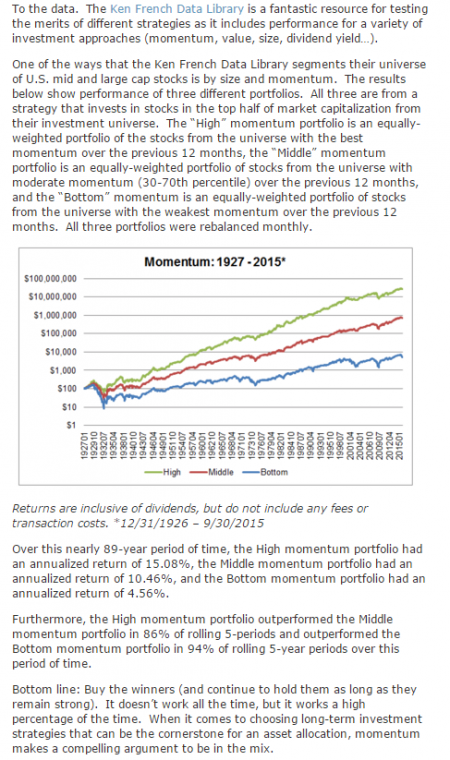
Momentum is a phenomenon that tends to leave academics scratching their heads as it shouldn't really exist in a world of perfectly efficient markets. Yet for 100 years a simple rules based, quantitative approach would have provided the opportunity to earn increased returns with reduced volatility and drawdowns vs. a buy and hold approach.
Buy the Winners
Eugene Fama, Father of the Efficient Market Hypothesis (EMH), has referred to momentum as "the premier market anomaly" which represents "the biggest embarrassment for Efficient Market Theory". And it's also very simple. So simple that it's under appreciated.

I'm going to paraphrase about a five minute clip of the podcast which can be heard here. I highly recommend it.
The podcast
Covel: Losses are statistically inevitable. There are still a number of people out there, some astute and some not, that still don’t want to imagine losses as a part of the game.
Kirk: Yep, people are desperate
The reality is that maybe the best you can look for over a long period such as 20 or 30 years is a Sharpe ratio of .8, .9, maybe 1.
Take a simulation of a 20% volatility with a 20% return per year. Every 2 years you will have a drawdown of 15% statistically, and a 20% drawdown every 4 years. And you don’t have to run very many simulations before you get a 40% drawdown that can last five years. Remember, this (simulation) is something that is guaranteed
Summary
The enemy of a good plan is the dream of a perfect plan. Drawdowns and losses are part of the game but your human nature of survival will put up a fight against rationality when drawdowns occur. The human brain is capable of incredible optimism as well as pessimism. Be aware of it, and have expectations that are statistically valid. Not just past performance.
Jesse Blom is a licensed investment advisor and Vice President of Lorintine Capital, LP. He provides investment advice to clients all over the United States and around the world. Jesse has been in financial services since 2008 achieving multiple industry achievements including qualifying membership in the Million Dollar Round Table for 5 consecutive years. Membership in this prestigious group represents the top 1% of financial professionals in the world. Jesse has a Bachelor of Science in Finance from Oral Roberts University.
Jesse is managing the LC Diversified portfolio.
What Is SteadyOptions?
Full Trading Plan
Complete Portfolio Approach
Diversified Options Strategies
Exclusive Community Forum
Steady And Consistent Gains
High Quality Education
Risk Management, Portfolio Size
Performance based on real fills
Non-directional Options Strategies
10-15 trade Ideas Per Month
Targets 5-7% Monthly Net Return
Recent Articles
Articles
Pricing Models and Volatility Problems
Most traders are aware of the volatility-related problem with the best-known option pricing model, Black-Scholes. The assumption under this model is that volatility remains constant over the entire remaining life of the option.
By Michael C. Thomsett, August 16

- Added byMichael C. Thomsett
- August 16
Option Arbitrage Risks
Options traders dealing in arbitrage might not appreciate the forms of risk they face. The typical arbitrage position is found in synthetic long or short stock. In these positions, the combined options act exactly like the underlying. This creates the arbitrage.
By Michael C. Thomsett, August 7

- Added byMichael C. Thomsett
- August 7
Why Haven't You Started Investing Yet?
You are probably aware that investment opportunities are great for building wealth. Whether you opt for stocks and shares, precious metals, forex trading, or something else besides, you could afford yourself financial freedom. But if you haven't dipped your toes into the world of investing yet, we have to ask ourselves why.
By Kim, August 7

- Added byKim
- August 7
Historical Drawdowns for Global Equity Portfolios
Globally diversified equity portfolios typically hold thousands of stocks across dozens of countries. This degree of diversification minimizes the risk of a single company, country, or sector. Because of this diversification, investors should be cautious about confusing temporary declines with permanent loss of capital like with single stocks.
By Jesse, August 6

- Added byJesse
- August 6
Types of Volatility
Are most options traders aware of five different types of volatility? Probably not. Most only deal with two types, historical and implied. All five types (historical, implied, future, forecast and seasonal), deserve some explanation and study.
By Michael C. Thomsett, August 1

- Added byMichael C. Thomsett
- August 1
The Performance Gap Between Large Growth and Small Value Stocks
Academic research suggests there are differences in expected returns among stocks over the long-term. Small companies with low fundamental valuations (Small Cap Value) have higher expected returns than big companies with high valuations (Large Cap Growth).
By Jesse, July 21

- Added byJesse
- July 21
How New Traders Can Use Trade Psychology To Succeed
People have been trying to figure out just what makes humans tick for hundreds of years. In some respects, we’ve come a long way, in others, we’ve barely scratched the surface. Like it or not, many industries take advantage of this knowledge to influence our behaviour and buying patterns.

- Added byKim
- July 21
A Reliable Reversal Signal
Options traders struggle constantly with the quest for reliable
By Michael C. Thomsett, July 20

- Added byMichael C. Thomsett
- July 20
Premium at Risk
Should options traders consider “premium at risk” when entering strategies? Most traders focus on calculated maximum profit or loss and breakeven price levels. But inefficiencies in option behavior, especially when close to expiration, make these basic calculations limited in value, and at times misleading.
By Michael C. Thomsett, July 13

- Added byMichael C. Thomsett
- July 13
Diversified Leveraged Anchor Performance
In our continued efforts to improve the Anchor strategy, in April of this year we began tracking a Diversified Leveraged Anchor strategy, under the theory that, over time, a diversified portfolio performs better than an undiversified portfolio in numerous metrics. Not only does overall performance tend to increase, but volatility and drawdowns tend to decrease: